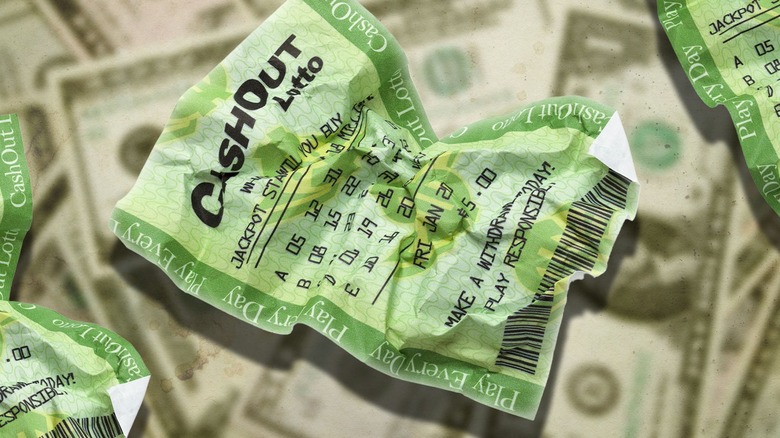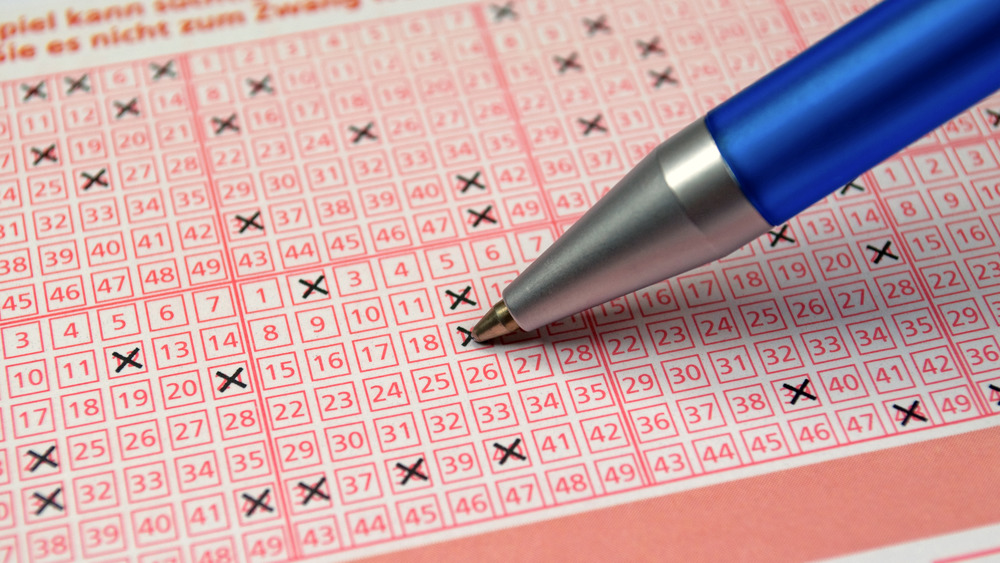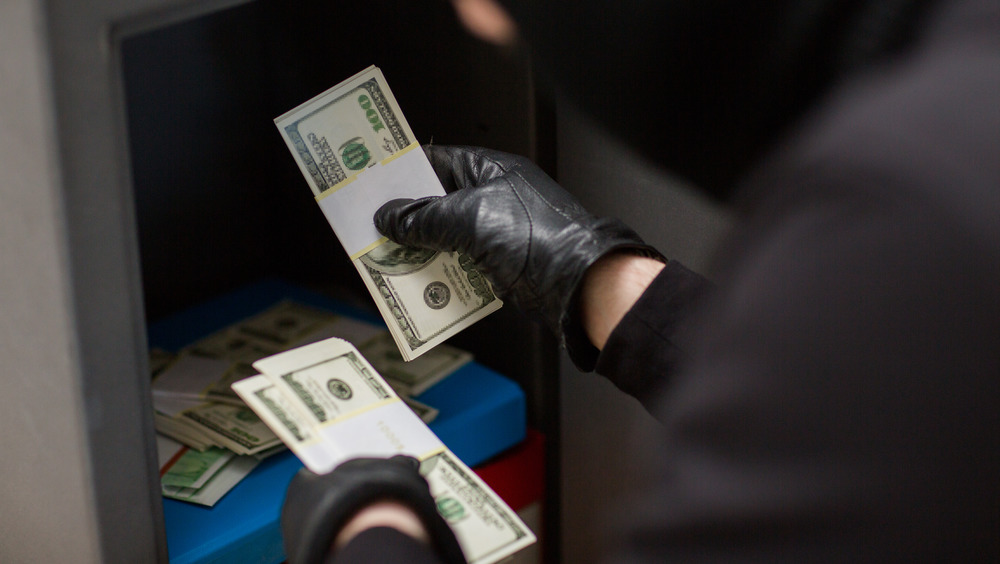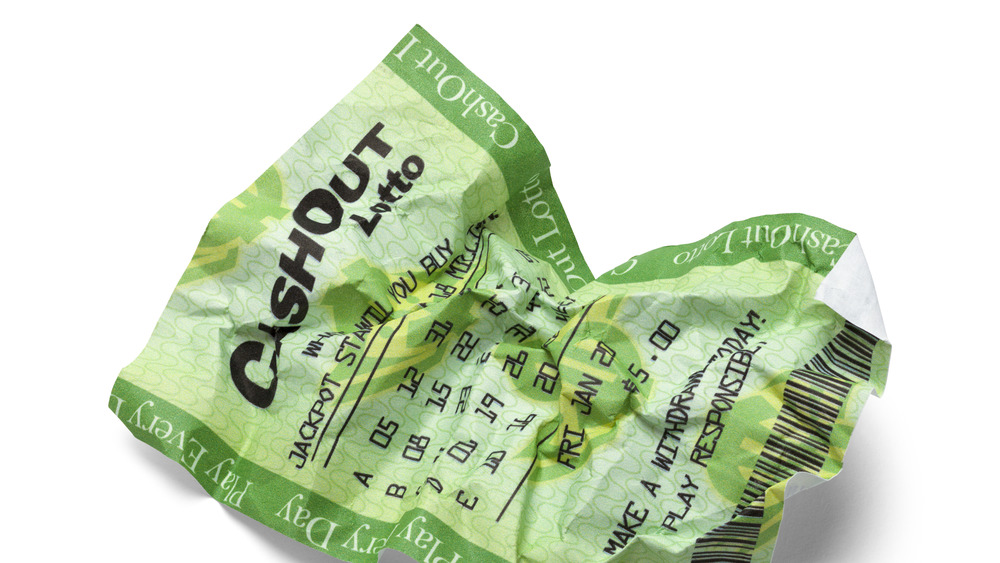Lottery Winners Who Lost All Their Money
As the saying goes, lotteries are for people who can't do math. As The Balance points out, the odds of winning a major lottery are somewhere in the 1 in 300 million range, which makes "winning the lottery" an absolutely terrible retirement plan. You have a much better chance of being attacked by a shark (odds: 1 in 3.75 million).
The lottery may be a terrible retirement plan, but it's also a very popular retirement plan. CNN reports that about half the population has bought lottery tickets, making it the most popular form of gambling in the country. It's easy to see why: Every lottery has a winner, and some of those winners take home absolutely enormous amounts of money.
Of course, many of those folks don't have any clue how to handle their newfound wealth, and horror stories of people whose lives are absolutely destroyed after suddenly becoming millionaires are very common. But even when people mishandle their riches, they usually find their way eventually. A special few mishandle things so spectacularly they actually lose every penny and somehow wind up worse off than before they won. Here, in all their glory, are lottery winners who lost all their money.
Mickey Carroll: Lost $14 million
Mickey Carroll was working as a garbage man in England when he won £9.7m (about $14 million) in 2002. Just 19-years-old, The Huffington Post reports that Carroll already had a police record, and had to pick up his check while wearing a monitoring anklet.
If you're thinking that didn't portend well for the young man, you would be correct. Carroll quickly became known as "the Lottery Lout" and "King of the Chavs" (a slang term for an anti-social, lower class young person). As reported by The Independent, Carroll promptly bought a mansion and continued living the criminal-adjacent, drug-fueled life he'd already been living, just louder and more aggressively. He threw lavish parties powered by crack cocaine, got himself arrested several times, and managed to spend every cent he had within four years. Four years. To quote Dave Chappelle, cocaine is indeed a hell of a drug.
Carroll eventually went to jail for nine months on a charge of "affray," which is essentially disturbing the peace via public fighting. Carroll and some friends invaded a Christian rock concert and beat up several attendees. Since blowing all his winnings, Carroll has sobered up and has been spotted working various low-level jobs in factories and warehouses.
Willie Hurt: Lost $3.1 million
For some lottery winners who wind up losing everything, it's just a wild ride. When it's over and the money's gone, they shrug and go back to work. For some, however, the distorting power of money leads them to a truly dark place.
Willie Hurt won $3.1 million in 1989, with the money paid out in 20 installments of $156,000 each. Married with three kids, that money should have ensured s family was financially secure and able to pursue their dreams, but instead it destroyed Willie's life. As reported by The Orlando Sentinel, within two years, he'd spent every dime on a truly epic addiction to crack cocaine, was divorced and estranged from his family ... and charged with murder.
According to AP News, Hurt had taken up with a girlfriend named Wendy Elizabeth Kimmey. They rented a room in a boarding house, and spent weeks partying with drugs and alcohol. Other residents reported they'd heard the couple arguing loudly, which is certainly not unusual when drugs and alcohol are involved. On September 19, 1991 Kimmey's body was found in the room—she'd been shot in the head. Hurt was an obvious suspect, and wound up turning himself in and making a confession—which he then claimed not to remember doing. His lawyer then revealed that all of Hurt's winnings had gone towards his divorce and crack.
Suzanne Mullins: Lost $4.1 million
One unfortunate fact about winning the lottery is that your check doesn't come with a financial adviser. Most lottery winners have never experienced having so much money, and have no idea how to handle it—and sometimes their attempts to do so just make things worse.
Such was the case with Suzanne Mullins, who won $4.1 million in 1993 and split her winnings with her husband and daughter. Opting for annual payments, she received close to $50,000 a year after taxes. As USA Today reports, a decade later Mullins wasn't just broke—she was deep in debt to the tune of $150,000.
The journey from millionaire to deadbeat began with good intentions. According to Forbes, Mullins's son was very ill and his medical care cost more than $1 million. Mullins was determined to pay for his treatment, so she took out a loan of nearly $200,000 against her winnings from a company called the People's Lottery Foundation, agreeing to pay back the debt as her annual payments came in. In 2000, however, the lottery rules changed and Mullins was allowed to take the remainder of her winnings in a lump sum—which she did. Instead of paying back her loan, however, she stopped making payments altogether. The Foundation sued, and Mullins was ordered to pay more than $150,000—but her lawyer at the time claimed she had zero assets.
Billie Bob Harrell, Jr.: Lost $31 million
When Billie Bob Harrell won $31 million in the Texas lottery in 1997, he'd been down on his luck for a long time. Working a series of low-paying jobs, Harrell had been barely getting by. The annual payments of $1.24 million made him an instant millionaire, and he was determined to use his newfound wealth for good.
For a change, Harrell's story doesn't involve shopping sprees, drug abuse, or conspicuous consumption. According to The Houston Press, Harrell tried to make a positive change in the lives of people around him. He bought homes for family and friends. He bought people cars. He made large donations to his church, and became known as an easy touch for a loan or a gift when people were in need.
Harrell gave away so much money, in fact, it strained his marriage—as did his acquisition of a young girlfriend. His wife filed for divorce and then Harrell took out a loan against his future winnings in order to get some fast cash. It was a very bad deal, netting him about $2.25 million against more than $6 million in future payments. After an attempted reconciliation with his wife failed, Harrell sadly took his own life less than two years after becoming a multi-millionaire, and a failure to plan for his tax burden ate up the remnants of his fortune.
If you or anyone you know is having suicidal thoughts, please call the National Suicide Prevention Lifeline at 1-800-273-TALK (8255).
Denise Rossi: Lost $1.3 million
Denise Rossi is one of the most notorious lottery winners in history—and one of the few who richly deserved losing every dime.
As reported by The Guardian, Rossi won $1.3 million in the California lottery in 1996. She told no one—not even her husband of 25 years, Thomas. What she did tell him was that she wanted a divorce, filing just 11 days after learning about her windfall. Not only did she keep her winnings secret from her husband, she kept them secret from the court as well, knowing that California is a community-property state. Thomas Rossi was stunned at the sudden divorce but didn't suspect anything was amiss.
As The Los Angeles Times notes, Thomas went through a rough patch after the divorce. His business failed, and he declared bankruptcy and took a part-time job to pay the bills. Then he accidentally received a letter from a company offering to advance Denise money against her lottery winnings—and her scheme fell apart. Thomas sued, and a judge found it hard to believe that Denise hadn't purposefully worked to obscure her winnings not just from her husband, but from the court—going as far as having her checks mailed to her mother's house. He awarded Thomas the entire amount—all $1.3 million—as a punishment for her attempted fraud.
William 'Bud' Post: Lost $16.2 million
For a land-speed record in terms of losing millions of dollars, look to Bud Post. Post won $16.2 million in 1988, paid out in 26 payments of nearly $500,000. That's life-changing money, especially for a guy who had about $2.46 in his bank account at the time.
As The Washington Post reports, the winnings certainly changed Post's life—for the worse. It took Bud about three months to get himself into serious financial difficulties. He spent close to $300,000 within two weeks of receiving his first payment. After three months, he was $500,000 in debt. He bought businesses for his family, a plane for himself (despite not having a pilot's license), and a huge mansion.
His landlady and part-time girlfriend sued, claiming he'd promised her he'd split his winnings—and won. Bud refused to pay, so a judge froze his lottery payments—which was problematic for Bud since he'd borrowed against those payments to free up short-term cash. To top it all off, Forbes tells us his estranged brother hired an assassin to kill him, hoping to get the money.
Incredibly, Post managed to sell everything—including the 17 lottery payments remaining—in order to clear up his debts and establish some sort of nest egg. He wound up with $2.65 million. He managed to squander that within a year, spent some time in jail, and at the time of his passing in 2006 he was living on $450 a month.
Marva Wilson: Lost $2 million
A common complaint made by lottery winners is the way people come out of the woodwork to ask for loans or investments. Sometimes these schemes are obvious—but sometimes they're more subtle. That's a lesson Marva Wilson learned the hard way.
As Fox 4 Kansas City reports, Wilson won about $2 million in the Missouri lottery in 2008. Wilson intended to be that rarest of creatures, the sensible lottery winner. She bought two houses, but then used most of her winnings to establish an annuity that guaranteed her an income of $30,000 a year. As the Kansas City Star notes, in 2010 Wilson needed some help with a real estate matter, and someone introduced her to a woman named Freya Pearson. Pearson was asked to help Wilson set up a lien on one of her properties, and to help Wilson file her taxes.
Instead, Pearson took control of Wilson's finances, set up a non-profit company in her own name, and transferred all of Wilson's remaining money—nearly half a million dollars—into it. Pearson then lived the high life, gambling, buying nice clothes, and traveling around the world. By the time Wilson figured out what had happened, Pearson had spent every dime. She was eventually sentenced to five years in prison for fraud and money laundering, but Wilson will never get her money back.
Jack Whittaker: Lost $314 million
Two things you assume about millionaires: One, they don't need to play the lottery, and two, they know how to handle large sums of money. Jack Whittaker proves otherwise. As AP News reports, Whittaker already had a net worth of $17 million or so when he won nearly $315 million in the Powerball jackpot on Christmas, 2002. The win made Whitaker an instant celebrity, but over the next 18 years it slowly took everything away from him.
As reported by The Washington Post, Whittaker's run of tragedy was remarkable. He gave his beloved granddaughter, Brandi, a large allowance, then watched her slide into drug addiction. She died in 2004 at the age of 17. His daughter, Ginger, died in 2009. He was arrested on DUI charges, and he was sued by a casino for not paying his debts. His house—uninsured—burned to the ground. In the midst of these tragedies, Whittaker told a local paper, "I wish I would have torn the ticket up."
Whittaker worked hard to lose his money. He was seen frequently in local strip clubs, drunk and offering $10,000 to women to sleep with him. He often bragged about carrying large amounts of money with him, and he was robbed several times as a result. Once he bragged about having $500,000 in a briefcase in his truck outside a club, and surprisingly someone went out and stole it. According to the New York Post, by 2007, Whittaker was broke.
David Lee Edwards: Lost $27 million
If you Google "lottery cautionary tales" one of the first results will be David Lee Edwards. As The New York Daily News reports, when Edwards won part of a $280 million Powerball lottery pot (his share was about $27 million after taxes) in 2001, he was a former convict and recovering drug addict living in his parents' basement. The lottery offered him a second chance.
But as The Lexington Herald Leader reports, Edwards quickly lost his head. In an incredible shopping spree, Edwards somehow managed to spend $12 million in just one year. He bought jewelry, a rad collection of replica swords, a mansion, sports cars, a second house, a Lear jet, some businesses, and a few racehorses. He also got married for a second time. It was a truly epic year.
Edwards and his wife began living a wild life fueled by drug use, and things began to unravel. The mansion was foreclosed on, and they moved into a warehouse he used to store his cars. He was hospitalized for a while, and debts went unpaid. He divorced his wife (who went on to stab her new boyfriend several times in a motel), but his health was failing. When he passed away in 2013 at the age of 58, he was living in hospice care. Every penny of his $27 million was gone.
Martyn and Kay Tott: Lost $5 million
Losing millions of dollars after you've won the lottery usually requires some real effort. Lawsuits, drug abuse, divorce—the usual roads to being completely broke take some time. Even the worst millionaires usually require at least a year of seriously bad decisions to lose everything. But Martyn and Kay Tott set the bar pretty high: They lost their lottery winnings before they even got them. Short version: They lost the winning ticket.
Longer version: As reported by The Independent, Martyn and Kay Tott played the lottery weekly, always playing the same numbers. On Monday, March 5, 2001, they watched the winning numbers on television and realized they'd won—£3 million (about $5 million). There was just one problem: They couldn't find the ticket. After searching the house exhaustively, they called the lottery up and told them what had happened.
As detailed by The Guardian, the Totts had enough detail to be taken seriously, and an official investigation was launched. Every aspect of the Totts's story checked out, and the lottery eventually concluded that they had almost certainly bought the winning ticket as they'd claimed. The problem? So much time had passed—tickets had to be redeemed within three months—they were disqualified, and got nothing. The strain led the Totts to split up, and Martyn admits he briefly joined a cult as he searched for meaning in a cruel universe.
Callie Rogers: Lost $2.9 million
Incredibly, Callie Rogers was just 16-years-old when she won a lottery in England worth £1.9 million (about $2.9 million) in 2003. It's safe to say that the majority of 16-year-olds in the world are not great at making sensible decisions, so it's not too surprising that most of Callie's decisions involved purchasing and snorting large amounts of cocaine.
As the Manchester Evening News reports, Rogers also spent a good amount of money on breast implants, went on lavish trips, bought fancy cars, and loaned lots of money to people she no longer considers friends.
But as the Huffington Post makes clear, it was Callie's love for illegal drugs that probably ate up most of her money. She admits to having spent nearly $400,000 on cocaine, though the accuracy of her accounting is certainly up for debate. Rogers, who suffered sexual abuse as a child and attempted suicide four times after winning the money, is completely broke today—but insists she's happy in her new, slightly less lucrative life. Unsurprisingly, she advocates for raising the age limit for playing the lottery, sensibly noting that teenagers aren't capable of making the sorts of decisions required of millionaires.
If you or anyone you know is having suicidal thoughts, please call the National Suicide Prevention Lifeline at 1-800-273-TALK (8255).
Lara and Robert Griffith: Lost $2.4 million
Lara and Robert Griffith's tale of rapidly melting lottery winnings is fairly typical. In 2005, the couple bought a lottery ticket on a whim and wound up winning £1.8 million ($2.4 million). As reported by Worldnation, instead of carefully planning how to use that money to set themselves up for life, the Griffiths both quit their jobs, sold their humble home, bought a mansion and fancy cars, and booked a luxurious vacation.
Robert was an aspiring musician, so he spent a load of money recording an album with his band, and hired an expensive publicist to promote them—but they only managed to sell 600 copies of their single. Lara went shopping—a lot. In a nod towards the future, they launched a beauty salon they hoped would provide an income stream. They also made some real estate investments—just before the global housing crisis in 2008.
By 2009, the couple only had $900,000 left. Their house burned down, and the salon business was failing. Roger had an affair, packed his bags, and left. Not long after, all the money was gone, and Lara took a job at the very salon she'd once owned in order to pay her bills.












